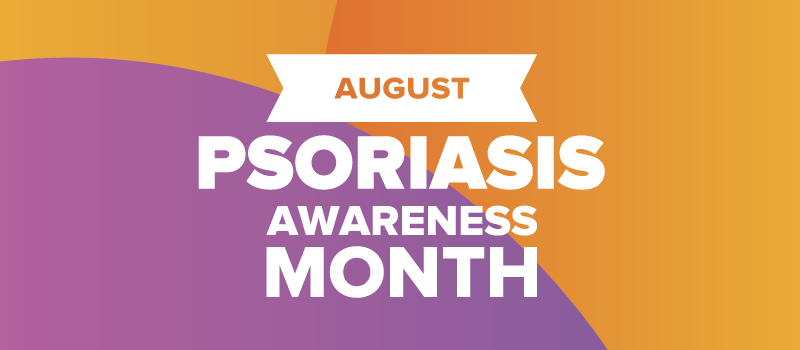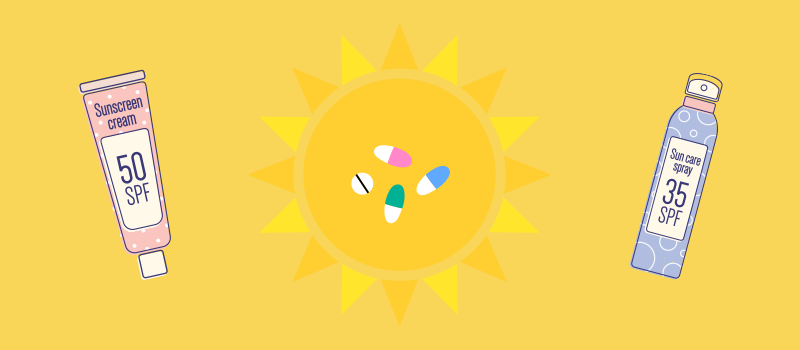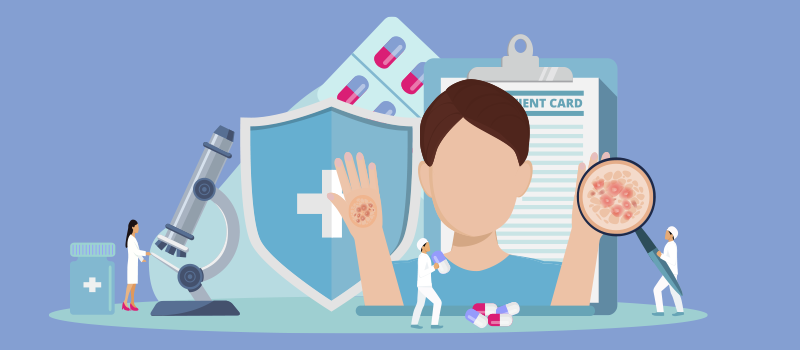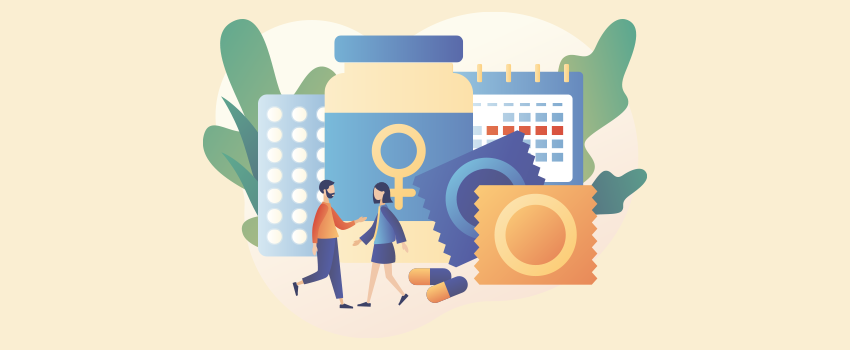What’s the Buzz
The Bee Healthy Blog
Is Accutane the Best Acne Treatment For You?

Perhaps you have tried various over-the-counter anti-acne treatments. Maybe you have even received a prescription topical cream or oral antibiotic from your dermatologist. Yet your acne persists. If this sounds familiar, a medication called isotretinoin may help.
Isotretinoin is a generic medication that is available under various brand names like Claravis®, Absorica®, Sotret®, Myorisan®, Amnesteem®, and Zenatane®. The brand name Accutane® was discontinued more than a decade ago but continues to be used in reference to isotretinoin and its generics.
Isotretinoin has been approved by the U.S. Food and Drug Administration (FDA) for the treatment of severe nodular or cystic acne that is unresponsive to conventional treatments. It is, therefore, considered a last resort acne treatment
Please continue reading to learn more about Accutane (isotretinoin). This will help you decide whether it is the right acne medicine for you.
What is isotretinoin?
Isotretinoin is a retinoid, made from synthetic vitamin A that inhibits sebaceous gland function and keratinization. It is a powerful prescription acne medication used to treat severe acne. Isotretinoin is available in pill form and is taken by mouth once or twice a day.
Do dermatologists recommend Accutane for severe acne?
The American Academy of Dermatology recommends isotretinoin use when other treatments have failed to clear the skin. Dermatologists say Accutane is the closest we have to a cure for severe inflammatory acne associated with deep, painful cysts and nodules. It is a highly effective drug that can give long-lasting results.
Isotretinoin can clear up acne that has not improved with other treatments. Patients with persistent nodular or cystic acne are excellent candidates for isotretinoin and should at least be considered for this treatment. While dermatologists cannot promise that Accutane will clear your acne forever, in the majority of patients it gets rid of acne for good.
How does Accutane work?
Pimples develop when excess oil clogs skin pores. Accutane works by shrinking the sebaceous (oil) glands and reducing the amount of oil the skin makes, thus unclogging the pores. It works against acne in all parts of the body, including the face, neck, chest, and back. The effects of isotretinoin continue even after you stop using it.
Is Accutane the best acne treatment?
Accutane is a potent drug that is effective against nearly all types of acne breakouts. It can treat moderate to severe scarring acne, including acne that persists after several years of treatment with creams and antibiotic pills. Accutane is safer than long-term antibiotic use.
Most acne treatments are antibacterial agents that are effective only when used daily. The effects of isotretinoin, on the other hand, continue after you stop taking the medication. These are all points in favor of Accutane.
However, like all medications, Accutane carries the risk of side effects, some of which can be severe. It may or may not be the best acne treatment for you. It is important to discuss the pros and cons with a board-certified dermatologist before taking isotretinoin.
Is there a better treatment than Accutane?
In most people, acne gets better or much better after isotretinoin treatment. Isotretinoin cures acne in about half the people who take it, meaning they never have to do anything for acne ever again.
Notably, around 1 in 5 patients have a temporary worsening of their acne in the first few weeks of treatment, followed by clearing up of the skin. Rarely, a patient’s acne can get much worse after isotretinoin treatment. Around 1 in 5 people will require a second course of treatment with Accutane.
What is the correct Accutane dosage?
The correct Accutane dosage depends on body weight. Doctors will typically start at a lower dose to mitigate the side effects and give the body time to adjust. The dose is then slowly increased to a therapeutic level over a period of 1-3 months.
Taking more isotretinoin increases the chances of a cure. However, while low doses are generally well tolerated, higher doses can cause nasty side effects. The dose, therefore, needs to be adjusted to strike a balance between effectiveness and side effects.
How should I take isotretinoin?
Doctors advise taking Accutane with fatty foods to help with the absorption of the drug. While taking isotretinoin, it is important to limit or avoid alcohol intake. Be sure to tell your doctor about all the other medicines you are taking, including antibiotics, as there can be drug interactions.
How long is the course of treatment?
Most people need one 4-6 month course of treatment with isotretinoin to get good results. Some patients require a second Accutane course to completely clear the skin. It is worth noting that there is a lifetime cap on the total dosage for this drug, so it’s important to get medical advice, diagnosis, or treatment from a board-certified dermatologist to ensure you stay within the limits.
What are the risks of taking Accutane? Can it cause severe birth defects?
More than 2 million people have taken isotretinoin. It is a well-studied drug and a lot is known about the safety issues surrounding its use.
Accutane is a derivative of vitamin A and can be harmful if it builds up in the body. If a woman should become pregnant while taking this medicine, it can cause severe birth defects. However, because it is a naturally occurring substance, the body quickly clears the drug from the bloodstream in about 10 days. Therefore, there is no effect on future pregnancies.
What is iPLEDGE?
Because of the serious risk of birth defects, dermatologists only prescribe Accutane after other acne treatments have failed. People who are prescribed isotretinoin are required to enroll in iPLEDGE, a government registry that is designed to prevent women from becoming pregnant while taking isotretinoin.
The program requires women to undergo two negative pregnancy tests and promise to use two forms of birth control (note that progestin-only birth control may not be effective while taking isotretinoin). Also, because isotretinoin can potentially cause liver damage, monthly blood tests are necessary to monitor liver function (and check for pregnancy). In men, the iPLEDGE program requires monthly blood tests to monitor liver function.
After fulfilling these conditions and receiving an isotretinoin prescription, a patient has 7 days to fill it. If they miss this window, they must wait 30 days before they can get a new prescription. Also, women are advised to wait at least one month after getting off isotretinoin before they become pregnant or breastfeed.
What are the side effects of Accutane?
The most common side effects of isotretinoin are dry eyes, dry mouth, chapped lips, dry nasal passages, nosebleeds, and dry and peeling skin. Isotretinoin may also cause itchiness and photosensitivity (sensitivity to sunlight). Other possible side effects include joint and muscle aches and pains, temporary hair thinning and shedding, increased blood sugars, and increased blood cholesterol. More serious side effects include liver damage, inflammation of the pancreas, bone loss, and stroke.
Can Accutane give you depression?
Some patients who were taking isotretinoin in the early 2000s died by suicide, leading to questions about its links to mental health problems. However, studies have shown that patients taking isotretinoin have lower suicide rates compared to the general population. Notably, severe acne with red, angry, pus-filled bumps can independently lead to depression. Treatment may, therefore, relieve depression symptoms. Nonetheless, it is important for anyone taking isotretinoin to be monitored for mood changes.
How do I decide to take Accutane?
Accutane (isotretinoin) is a highly effective FDA-approved drug to treat severe acne, but there are risks to be considered. With careful treatment planning and monitoring by a healthcare professional, isotretinoin can be used safely in the vast majority of patients. If you have struggled with severe acne for years, this medication can be life-changing. But you should not take this drug lightly. Be sure to comply with all the instructions and meet with your dermatologist once a month to be medically reviewed.
References:
1. https://www.aad.org/public/diseases/acne/derm-treat/isotretinoin











SOCIAL